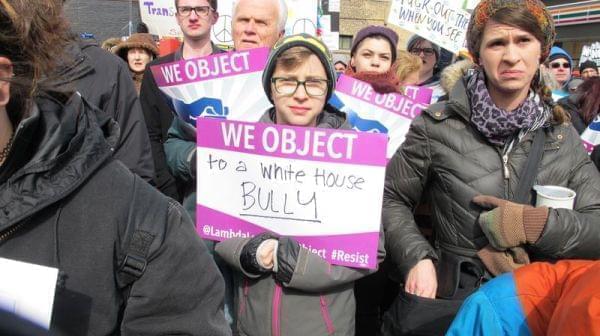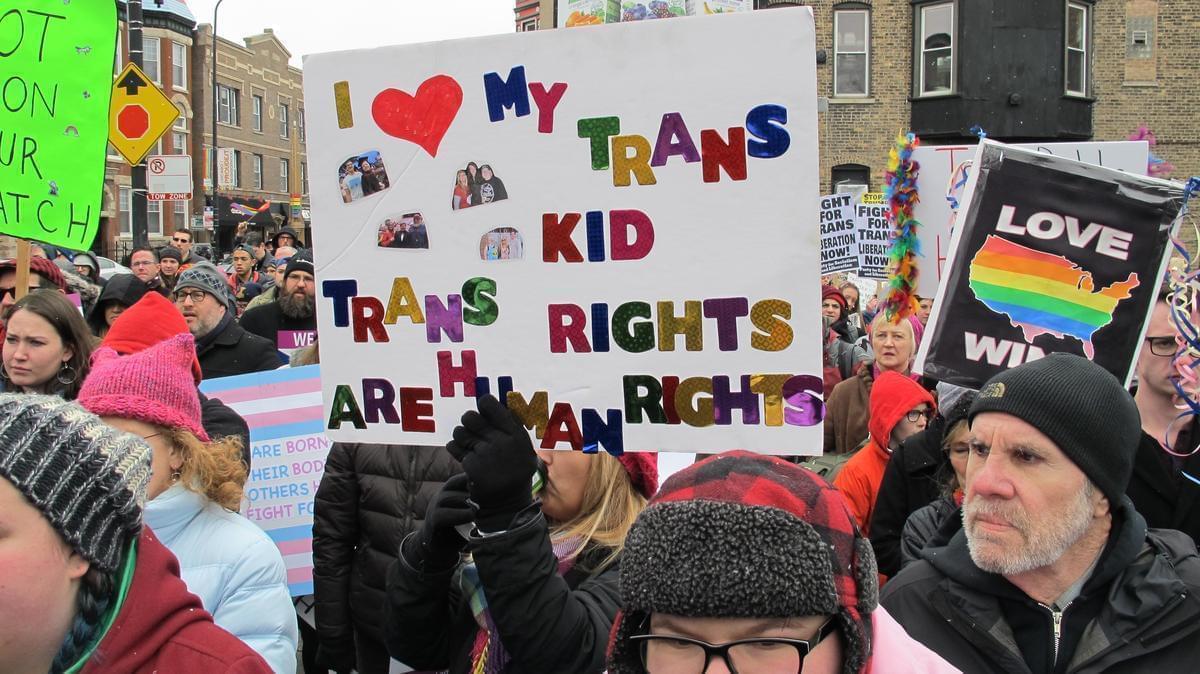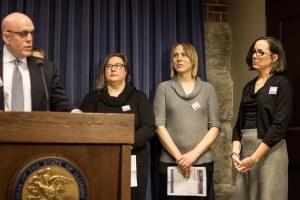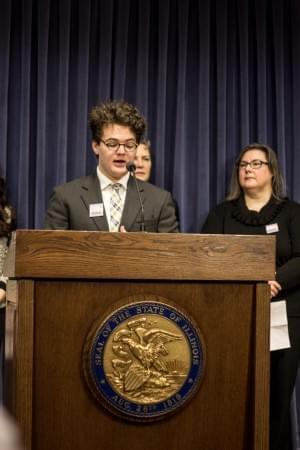Illinois Issues: LGBT In The Time Of Trump

Protesters in Chicago rally against the Trump administration's rollback of protections for transgender students. Equality Illinois
Alex McCray didn’t want to believe Donald Trump had won the election. In the words of the transgender nursing student from downstate Sherman: “I was hoping it was all just one terrible nightmare. It felt like my rights were being ripped out right from underneath me.”

Alex McCray received an award from the ACLU of Illinois for advocating for transgender rights.
But early in the Trump presidency it seemed as if LGBT advocates might not have had as much to fear as they expected about the candidates’ harsh rhetoric and selection of a running mate who had aggressively pushed anti-gay measures. One of President Donald Trump’s first actions as president was to announce that he was going to continue his predecessor’s protections for LGBT employees of federal contractors. "President Donald J. Trump is determined to protect the rights of all Americans, including the LGBTQ community," White House statement proclaimed.
Then came the flurry of decisions that could only be considered anti-LGBT. For LGBT Illinoisans who have had antidiscrimination protections since 2006, the issues affect them too.
“I think the most troubling piece is (Trump's actions) say it’s OK to be biased — that’s OK to show that bias," says Mike Ziri, policy director of Equality Illinois, which is an LGBT rights organization pushing several pro-LGBT pieces of legislation in Springfield.
In mid-February Trump undid protections for transgender students at school.
The Justice Department and the Education Department, in a reversal of an Obama administration directive, issued a guidance letter that called for schools to prohibit transgender students from using the restroom matching their gender identities. Seeing that, the U.S. Supreme Court said it would not hear the case of Gavin Grimm, a Virginia student who had sued his school district over the right to use the boy’s bathroom.
His case would likely affect thousands of LGBT students across the country. In a study, researchers at the University of California School of Law's Williams Institute estimated that almost 150,000 American teenagers from 13 to 17 years old — or one out of every 137 — would identify as transgender.
McCray, a transgender man who pushed his school district to adopt a policy letting transgender students use the restrooms and locker rooms of their choice, says: “When I first heard the Supreme Court was going to take on his case, I was absolutely thrilled. It was my expectation that they would make the right choice, allowing him (to use the boys’ restroom) — and hopefully setting a precedent that all trans students would be allowed in the restroom.” When the court announced it would send the case back to a lower court, he says, “I was greatly disappointed. I think that it’s something that’s very important to do right now…. It’s just the idea of basic human rights.’’

Then candidate Donald Trump.
Then, Trump appointed Roger Severino as Director of the Office for Civil Rights at the Department of Health and Human Services. Severino was described as an “anti-LGBT extremist” in a joint statement by the Human Rights Campaign, National Center for Transgender Equity and other organizations. After that, the U.S. Census Bureau determined that it would not ask questions about LGBT status on its 2020 survey.
“Economists, sociologists, demographers and health scholars are learning about LGBT people’s economic challenges, family situations and health disparities by analyzing existing federal data. This research raises issues that are relevant to many areas of federal policy. It’s essential that we include more questions on sexual orientation and gender identity on surveys — not fewer,” a press release from the Williams Institute at UCLA quoted Lee Badgett, Williams Institute distinguished scholar and professor of economics at University of Massachusetts, Amherst.
“We do have concerns’’ about Trump. “I’d say they started last year in the campaign,” says Ziri, who points to former Indiana Gov. Mike Pence’s support for the discredited practice of gay conversion therapy, and other actions considered to oppose LGBT rights. After his inauguration, Trump named Jeff Sessions, who as a senator had supported anti-LGBT legislation, as attorney general. Trump's "appointments have been very troubling to the LGBT community,” Ziri says.
“It affects us because Illinois is part of the United States. We have strong protections for civil rights in Illinois, but some of the actions out of Washington indicate it is OK for personal bias to flourish. We’re prepared to fight with our allies in Washington, D.C. — including Sen. (Dick) Durbin and Sen. (Tammy) Duckworth — to ensure real achievements we’ve made don’t get rolled back.”

Protesters rallied in February in Chicago in opposition to Trump administration action.
And he notes, hate crimes are up. Of the hate crimes in the United States in 2015, 20 percent were against LBGT individuals.
Dr. Magda Houlberg, chief medical officer at the Howard Brown Health Center in Chicago, said in a House committee hearing: “In the first few months of 2017 in the United States, seven transgender women of color have been murdered including … a resident of Illinois. She is the second transgender Illinois resident to be murdered in the past six months. The violence against transgender people and particularly against transgender women of color continues to escalate across the United States.”
Four pieces of Equality Illinois-backed legislation are still being considered by the General Assembly this year. The major focus of the organization is a bill that calls for removing the requirement that transgender people have surgery before they can change their birth certificate to match their gender identity. Greg Harris, the Chicago Democrat who sponsored House Bill 1785, says the Vital Records Act is now out of date. Illinois in 1955 became the first state to allow gender markers of transgender people to be switched. Under the bill, the gender marker could be changed through notarized medical certification rather than surgery. Now 14 states. Washington, D.C. and the federal government have such laws.

Rep. Greg Harris speaks at a press conference about a bill that would change the Vital Records Act to ease identification document changes for transgender people.
“House Bill 1785 reduces the risk of discrimination, harassment, embarrassment and assault that transgender people born in Illinois may face by making it possible to correct their core identification document — their birth certificate — to match their core identity,” Houlberg said. She noted that only up to 20 percent of transgender people “have had access to surgical intervention”
Maya Zimmerman, a transgender woman from Chicago, testified in that House committee, too.
“I would very much like to change the gender marker on my birth certificate,’’ she said. “As part of my transition process, I’d contemplated surgery. Indeed, I would like to have surgery but the reality is that surgery is not something I’m able to afford right now, and I don’t know whether I’ll ever able to afford it,” she said. “My financial circumstances should not be a road block to being recognized fully as a woman.” Ziri says his organization gets several contacts a week from transgender individuals who are frustrated that they can’t change birth certificates.
One Chicago mother of three, who gave the committee a pseudonym for her name when testifying, talked about her 9-year-old daughter’s experiences as a transgender youth. The child was assigned male at birth but gave clues that she might have been misidentified. She wanted girl clothes and toys like dolls rather than the trucks and trains she was offered.
“Everything considered girl in our society, she wanted; everything considered boy, she rejected.” Before transitioning, her daughter was depressed and anxious, even questioning whether she “wanted to be.” That specter of suicide is “the worst fear of any parent.”
Meanwhile, JoAnne Geigner of Urbana told that committee that her 15-year-old son, who was assigned female at birth, came out at transgender when he was 13. As he matures and reaches new milestones, he will be expected to provide a birth certificate in such circumstances as applying to colleges and for jobs and health insurance.
“His maleness is not dependent on his body parts,’’ Geigner said. “No one should be forced to have surgery by an outdated law.”
Grayson Alexander, an 18-year-old transgender student at Springfield High School, told Illinois Issues that applying for colleges has been complicated by his gender status.

Transgender student Grayson Alexander speaks in favor of House Bill 1785.
“There were so many phone calls to colleges, like which one do you want me to put down. And each school had something different to say.”
Ralph Rivera, a representative of the conservative Illinois Family Institute, told the committee: “I think we should have compassion for those who are struggling with this,” but there are other girls who would be traumatized by having a man in the girls’ locker room. “Where’s the compassion for those children?”
Illinois Issues contacted the four representatives who voted against the bill in committee. Three did not respond repeated calls for comment. Another could not be reached for comment.
The other bills affect different facets of life for LGBT people.
Senate Bill 1761 prohibits a defense for violent assault or murder based on victim’s sexual orientation or a nonviolent sexual advance. This is the so-called “gay panic defense” and “transgender panic defense.” Proponents of the bill want to ensure that this defense will not be used in Illinois again to mitigate or eliminate murder charges. Ziri says it has been used in 23 states and the only state to ban it is California. “It’s a heinous defense tactic,’’ he says. “Particularly because there has been increase in hate crimes.”
Senate Bill 889 would prohibit discrimination in jury selection in areas including LGBT status. This would align state courts with federal courts, including in Illinois. Another bill, SB 1670, would give applicants to boards and commissions under the governor's office a chance to disclose their sexual orientation, which Ziri says would likely lead to more inclusion of LGBT individuals. “The real intent is to see the data and to make sure boards are representative of state of Illinois.”
Those bills have been approved in committee. Two anti-LGBT measures did not get out of committee. HB 664 would prohibit transgender students from using facilities matching their gender identities. It was never called for a hearing or a vote.
Rep. Tom Morrison, a Palatine Republican, told the Chicago Tribune that students shouldn't have to change in front of those “whose anatomy is different,” but he said it's important to also "compassionately and reasonably" address the needs of transgender students. “We can do that in a way that does not disrupt or take away from the privacy rights of the other students," Morrison said.
Meanwhile, SB Bill 64, sponsored by Sen. Kyle McCarter of Lebanon, would prohibit discrimination against “a person if the person believes or acts under a religious belief or moral conviction that marriage is only between one man and one woman, or that sexual relations are properly reserved to such a marriage.” That bill also failed to get out committee. McCarter could not be reached for comment.
But with at least 40 percent of the homeless youth being LGBT, social services are key to that community, says Ziri. That means, “we also have grave concerns about this budget.” The situation jeopardizes Illinois’ status as one of the nation’s leaders’ in LGBT rights and protections, he says.
Ziri says, “Our goal is to ensure we don’t go back and keep our progress going forward to make sure that Illinois is a welcoming place for LBGT individuals to live, work and to be here.”
Links
- Services for Transgender Patients Expanding, Still Lacking
- Transgender Students; Social Service Lawsuit; Bison At A Physics Lab
- Lawmaker Wants Transgender Kids Out Of Standard School Bathrooms
- Being Transgender In Illinois
- U Of I Groups Demand Changes In Demographics, Wages, Life For LGBT Students
- LGBT Foster Children; Lost And Found Dogs; Precision Medicine; Pencils World Record
- LGBTQ Rights In Illinois; Depression During Pregnancy; #ILBudgetNow

